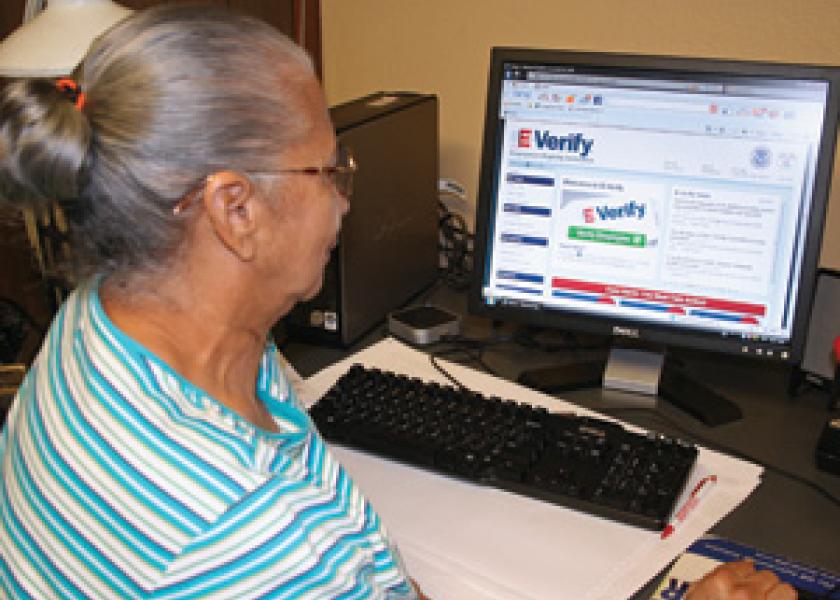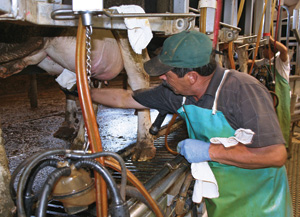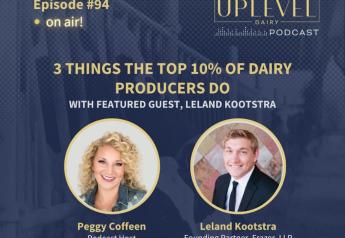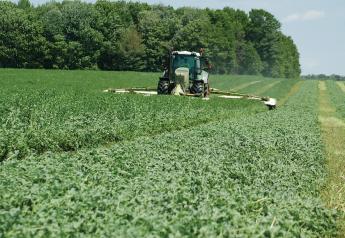E-Verify: Coming Soon to Your State?

More states mandate use of employee verification system
Dairy interests across the country are voicing concern that the U.S. Supreme Court’s decision this past spring to uphold Arizona’s E-Verify law will encourage other states to adopt the electronic employee verification program.
Many producers worry that the required use of E-Verify could reveal more undocumented workers in farming operations, forcing dairies to lose much-needed employees.
In fact, their worries have already materialized, says agricultural attorney Ryan Miltner.
Besides Arizona, the states of Alabama, Mississippi and South Carolina require all employers to use E-Verify. Fourteen other states require at least some employers to use it. In addition, legislation to mandate its use is pending in Michigan, Pennsylvania and New Jersey.
Legislators at the federal level also are considering bills to require employers to use E-Verify. Among them:
- The Legal Workforce Act (H.R. 2164), introduced in June by Rep. Lamar Smith (R-Texas), would require most employers to use E-Verify within two years of enactment.
- S.B. 1196, introduced in June by Sen. Chuck Grassley (R-Iowa), would make E-Verify mandatory for all employers within one year of enactment.
- The Jobs Recovery by Ensuring a Legal American Workforce Act (H.R. 800), introduced in February, mandates E-Verify for all employers over a two-year period.
- The Secure America through Verification and Enforcement (SAVE) Act (H.R. 2000) provides a framework for increased border security as well as mandatory E-Verify use, with mandatory compliance phased in over a four-year period.
"With its heavy agenda, Congress may have little room for immigration, at least for this calendar year," Miltner says. "However, when Congress does finally act on immigration, it certainly looks like mandatory E-Verify will be part of the package."
E-Verify helps employers determine the employment eligibility of new hires and the validity of their Social Security numbers. U.S. Citizenship and Immigration Services (USCIS), part of the Department of Homeland Security, operates the Internet-based system.
Bonus Content |
In a 5-3 vote on May 26, the Supreme Court upheld the legality of Arizona’s law requiring all employers in the state to use E-Verify.
In the case, known as Chamber of Commerce v. Whiting, the court also upheld the Arizona law that revokes the licenses of businesses that hire illegal immigrants.
For now, the decision impacts employers only in Arizona and the other states that mandate E-Verify use. But the trend toward a national mandate worries Wisconsin dairy producer Julie Maurer.
"As employers, we take steps to ensure that we’re hiring eligible workers," Maurer says. "But if E-Verify goes into effect, then potentially some workers milking cows and providing safe, affordable food for America will no longer continue working."
Studies have found that more than 99% of authorized workers received a correct initial finding when employee records were examined through E-Verify. "Of the 1.7% who received initial system mismatches, 0.3% were later confirmed as work-authorized," says USCIS spokeswoman Marie Thérèse Sebrechts. E-Verify accuracy continues to improve, she adds.
In Arizona, where immigration is "a very toxic subject," he says, dairy producer Ross Tappan had hoped the Supreme Court would rule differently. He wants to see immigration reform, although not as drastic as the 1986 amnesty program.
"I don’t have the answers," Tappan says. "It’s a tough situation."
While still analyzing the decision and its implications, the National Milk Producers Federation (NMPF) says it was disappointed by the Supreme Court’s ruling.
"But we must understand that the court’s decision doesn’t support any of the other sections of the Arizona legislation," NMPF spokesman Chris Galen says. "This rule is solely on state employer sanctions laws. The decision does not give states or local governments a blank check to pass any and every immigration law."
California is one state that’s not likely to see an impact from the decision, says Michael Marsh, CEO of Western United Dairymen. The Golden State doesn’t have the same laws regarding E-Verify or business license issuances as Arizona.
 |
| "People may talk about the high success rate of E-Verify, but it is not everything it’s touted to be," says Bob Naerebout of the Idaho Dairymen’s Association. PHOTO: Catherine Merlo |
"We could see a copycat effort in California from conservative legislators, but I can’t see it passing or the governor signing it," Marsh says. Still, the concerns raised by dairy interests point to "the need for real immigration reform and AgJOBS to bring clarity to the issue," he adds.
Bob Naerebout, executive director of the Idaho Dairymen’s Association (IDA), says that Idaho is considering legislation to mandate E-Verify use, a move which IDA opposes.
"People may talk about the high success rate of E-Verify, but it is not everything it’s touted to be," Naerebout says. "It doesn’t catch all improper documentation and gives a false sense of security."
Producers in the states affected by the Whiting ruling should familiarize themselves with the specific provisions of their state law and how it might impact their business, says attorney Erich Straub.
"Producers elsewhere should be vocal with state legislators about the negative impact that the passage of such a law will have on business," Straub adds. "All producers should continue to pressure their federal representatives to resolve the problem in the right manner and place: in Washington, D.C., with federal immigration reform."
Maurer agrees. "The real issue is that our federal government needs to pass immigration reform, rather than allowing rules to be made on a state-by-state basis," she says from her family dairy.
"That reform must include a guest worker program so that when our industry finds itself in a situation like it does now, where people don’t want to take the jobs we have to offer, there is an option," Maurer says.







